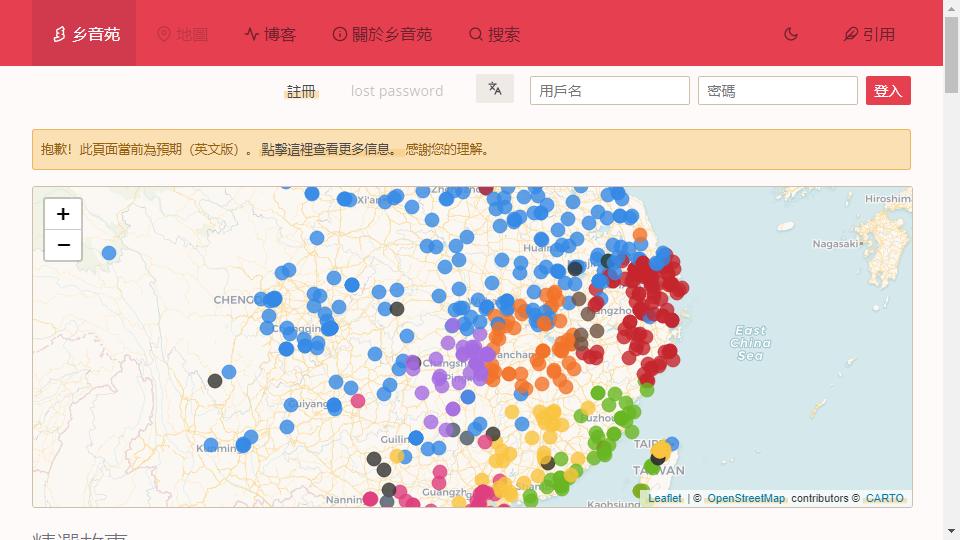

Phonemica: Xiangyinyuan China Phonemica is a project dedicated to recording Chinese dialects and their variants, leaving behind each interesting story and the nuances of each local language through the telling of a single story. The team is composed of volunteers from home and abroad.
The mission of the Village Voice Garden: "To capture Chinese stories from all corners of the world and present them through the most natural dialects of the tellers to show the world the richness of the Chinese language."
< p> Through storytelling, we hope to record the voice of every dialect of the Chinese language. We firmly believe that each dialect is a priceless treasure that carries the history and tradition, the customs of the society, and even the cultural deposits of the whole nation. China today encompasses a huge number of dialects, sometimes as diffe rent as Cantonese and Mandarin, sometimes with subtle differences in pronunciation and wording from village to village.But for a variety of reasons, more and more Chinese people - especially young people who have left their hometowns - are living in a Mandarin world. They use Mandarin to chat with their families, exchange pleasures with colleagues, listen to old friends, and find alumni for dinner. Their dialect will unknownly be silent with time. We can't stop this change, but we want to preserve the cultural heritage of dialects. We are collecting stories in dialects from all over the world, some from family members, some from teachers, some from friends, and of course we want your voice to be heard!
These recordings will be transcribed and shared on the website so that others can listen to your stories and enjoy the wonderful dialect of your hometown. p> On the one hand, these recordings he lp our descendants (who may no longer be fluent in the dialect) to hear their predecessors tell their stories. On the other hand, they are also useful for linguists to study the development and history of Chinese dialects, which can be used as a vehicle to better understand the great migrations and the spread of cultural development in China.
We started by looking for storytellers. We interviewed them first, sometimes in their local dialect, sometimes in Mandarin with a regional accent. We then post the interviews online, adding the Chinese characters, Roman characters (Latin characters) and international phonetic symbols that correspond to the recordings. We will also translate the stories into English.
All of this work is done by the volunteers of the Village Voice Garden, some of whom are online and some of whom are offline data collectors. If you are interested in these small tasks as we are, join our family!
Our History
The website of the Village Voice Garden was launched in May 2012 by Kellen Parker and Steve Hansen. Many years ago, probably in 2008, cheating blue in the brain to plan the prototype of the village sound court - hoping to show the difference of dialects. In the following years, 2009 and 2010, he and Si Yuanzhi worked together on this huge project, and then came what you see now.
Our team
The Village Voice Garden was made possible by a large number of volunteers. Ke cheated blue and Si Yuan straight build and maintain the site. If you have anything to say, feel free to contact us ~ we will be happy to share our story with you.
Phonemica is a project to record spoken stories in every one of the thousands of varieties of Chinese in order to We are a team of volunteers working within China and abroad.< ;/p>
Phonemica is a project to record spoken stories in every one of the thousands of va rieties of Chinese in order to preserve both stories and language for future generations. amp;gt;Our mission: Bringing the richness of oral Chinese to a wider audience, through the words of natural storytellers, from every corner of the world Phonemica is a crowd-sourced project to record spoken stories in every one of the We believe that each language and dialect is a priceless cultural treasure embedding history, social customs -- the knowledge of a people. contains thousands of language varieties, with differences as wide as Mandarin and Cantonese, as nuanced as the different words of neighboring countries. The Chinese language today contains thousands of language varieties, with differences as wide as Mandarin and Cantonese words, as nuanced of neighboring villages.
But with more and more people speaking Standard But with more and more people speaking Standard Mandarin with family members, coworkers, friends and schoolmates, many of these languages will disappear.
We We are collecting stories from grandparents, aunts, neighbors, and schoolmates, and we want to preserve the cultural heritage, They will be transcribed and shared on our site for others to hear.
< p>The recordings will provide a way for future generations to hear the stories of those parents, teachers and friends, told using the language they shared in common. time the recordings will help linguists study the history and development of the Chinese language, allowing us to better At the same time the recordings will help linguists study the history and development of the Chinese language, allowing us to better understand the rich history of China, with its many periods of mass migration and the spread of cultural developments.All this work is done by Phonemica volunteers, both online and off. If you're interested, please get involved!< /p>
Phonemica was launched by Kellen Parker and Steve Hansen in May 2012. Kellen had come up with an outline of Phonemica many years earlier, probably 2008, with the general idea of showcasing dialect differences. it through 2009-10, the idea gradually developed into what you see today.

Links : poudr.xyz
This site is free of charge to add web sites. If you are interested, you are welcome to contribute! Contact Email:[email protected] ‖ Contact
Copyright © 2018-2025 en.sitegaga.com All Rights Reserved.